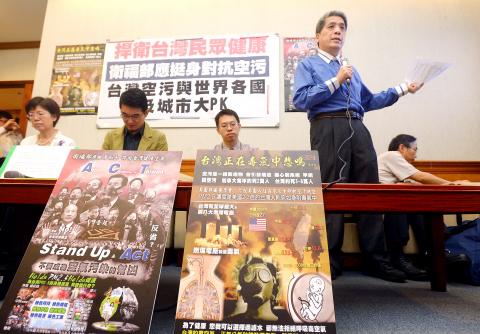The average air quality in Taiwan has become the worst among the four “East Asian Tigers” — Taiwan, Hong Kong, Singapore and South Korea — and even worse than some cities in China, the Taiwan Healthy Air Action Alliance and legislators said yesterday.
Alliance founder and Changhua Christian Hospital gynecologist Yeh Guang-peng (葉光芃) said he and the Changhua Medical Alliance for Public Affairs had analyzed air quality reports published by the WHO, and discovered that the annual average of PM10 (fine particles in the air smaller than 10 micrometers in size) concentration in Taiwan was as high as 54 micrograms per cubic meter.
He said the annual average PM10 level of Taiwan was about two times that of Austria and Singapore, the highest among the East Asian Tigers and even higher than some cities in Southeast Asia and China.

Photo: Wang Yi-sung, Taipei Times
Furthermore, Yeh said the PM10 annual average in Taipei — 47.1 micrograms per cubic meter, ranked only 1,089 among 1,600 cities around the world, showing that the nation’s air quality still has much room for improvement.
Comparing that level with a few cities in China, he said the PM10 levels in Shenzhen, Xiamen and Quanzhou were better than those in Chiayi and Greater Kaohsiung; and the air quality in Shanghai was better than Greater Kaohsiung’s Fongshan District (鳳山) and Greater Tainan’s Sinying District (新營).
The alliance said while the environmental and health agencies in other countries are working together to tackle air pollution problems, the Ministry of Health and Welfare seemed to be too passive in dealing with the health risks from serious air pollution.
Lin Chen-su (林真夙), a section chief at the ministry’s Health Promotion Administration, said the agency would work to improve health education to inform the public about air pollution and related health risks, and also to suggest prevention measures.
The Environmental Protection Administration said that the average PM10 levels in the nation have already decreased greatly over the past years, but sometimes high PM10 levels result from certain geographical and climate conditions, such as dust near river banks in central and southern Taiwan, but that it will continue to make efforts to reduce air pollution.
Changhua Medical Alliance for Public Affairs consultant Yang Joe-ming (楊澤民) said children, elderly people and people suffering from asthma or cardiovascular disease are more sensitive to air pollutants and should wear face masks when commuting to reduce harmful exposure.

DEFENSE: The National Security Bureau promised to expand communication and intelligence cooperation with global partners and enhance its strategic analytical skills China has not only increased military exercises and “gray zone” tactics against Taiwan this year, but also continues to recruit military personnel for espionage, the National Security Bureau (NSB) said yesterday in a report to the Legislative Yuan. The bureau submitted the report ahead of NSB Director-General Tsai Ming-yen’s (蔡明彥) appearance before the Foreign and National Defense Committee today. Last year, the Chinese People’s Liberation Army (PLA) conducted “Joint Sword-2024A and B” military exercises targeting Taiwan and carried out 40 combat readiness patrols, the bureau said. In addition, Chinese military aircraft entered Taiwan’s airspace 3,070 times last year, up about

The Overseas Community Affairs Council (OCAC) yesterday announced a fundraising campaign to support survivors of the magnitude 7.7 earthquake that struck Myanmar on March 28, with two prayer events scheduled in Taipei and Taichung later this week. “While initial rescue operations have concluded [in Myanmar], many survivors are now facing increasingly difficult living conditions,” OCAC Minister Hsu Chia-ching (徐佳青) told a news conference in Taipei. The fundraising campaign, which runs through May 31, is focused on supporting the reconstruction of damaged overseas compatriot schools, assisting students from Myanmar in Taiwan, and providing essential items, such as drinking water, food and medical supplies,

A magnitude 4.3 earthquake struck eastern Taiwan's Hualien County at 8:31am today, according to the Central Weather Administration (CWA). The epicenter of the temblor was located in Hualien County, about 70.3 kilometers south southwest of Hualien County Hall, at a depth of 23.2km, according to the administration. There were no immediate reports of damage resulting from the quake. The earthquake's intensity, which gauges the actual effect of a temblor, was highest in Taitung County, where it measured 3 on Taiwan's 7-tier intensity scale. The quake also measured an intensity of 2 in Hualien and Nantou counties, the CWA said.

New Party Deputy Secretary-General You Chih-pin (游智彬) this morning went to the National Immigration Agency (NIA) to “turn himself in” after being notified that he had failed to provide proof of having renounced his Chinese household registration. He was one of more than 10,000 naturalized Taiwanese citizens from China who were informed by the NIA that their Taiwanese citizenship might be revoked if they fail to provide the proof in three months, people familiar with the matter said. You said he has proof that he had renounced his Chinese household registration and demanded the NIA provide proof that he still had Chinese